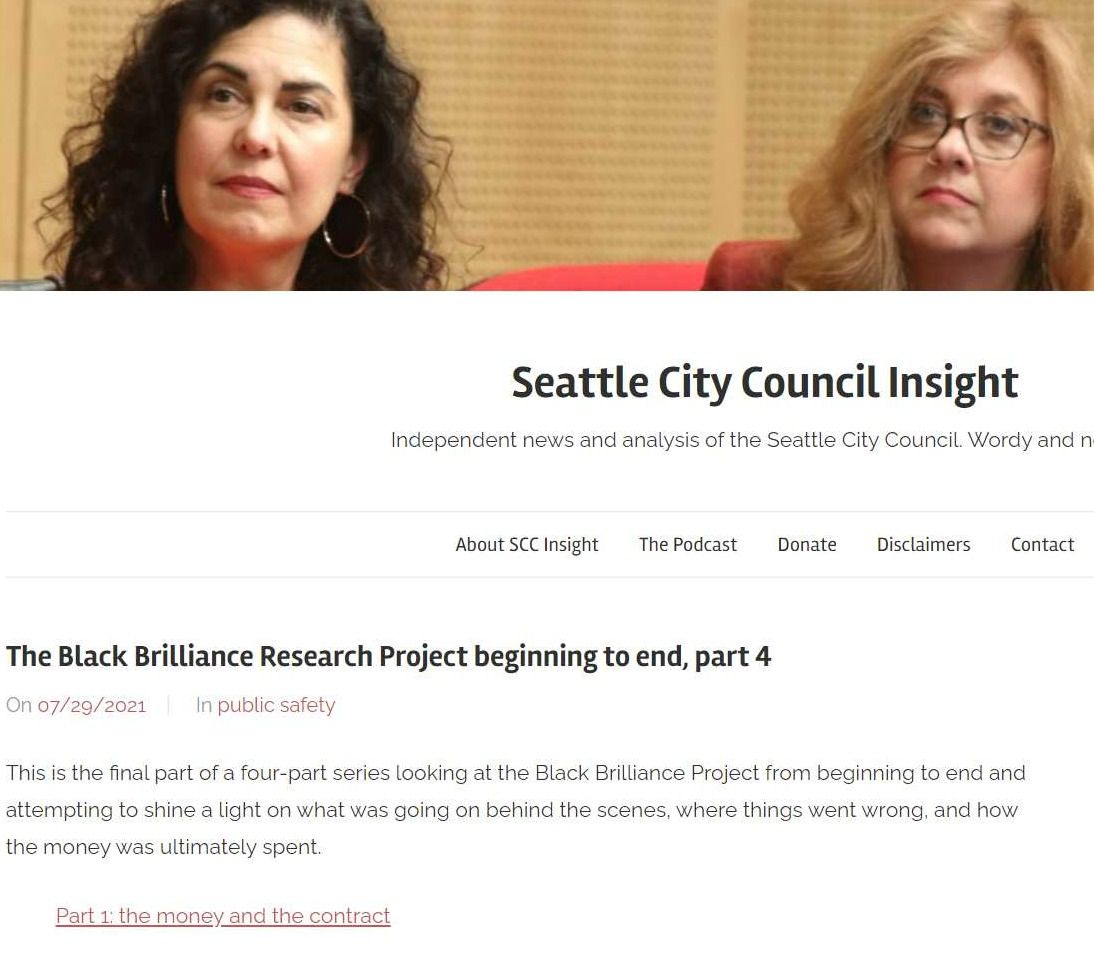
If you haven’t read it already, I can’t recommend more highly Seattle City Council Insight writer (and regular Post Alley contributor) Kevin Schofield’s four–part deep dive into the troubled $3 million Black Brilliance Research Project contract awarded by the Seattle City Council last year. It’s a lengthy read, but for anyone interested in how the current incarnation of the Seattle City Council, with its left activist supermajority, operates, it’s well worth the time.
Schofield worked his way through thousands of pages of emails, financial documents, and other public records to piece together a master narrative of how the troubled no-bid contract — intended to explore “the true sources of community safety in Black communities,” and is the basis of the $30 million plus participatory budgeting process initiated by the City Council — came together, and, at times, nearly fell apart.
Schofield did painstaking work in reconstructing the internal dynamics of the Council’s approach to the hastily developed contract, born in the immediate aftermath of the killing of George Floyd and the ensuing protests. The contract approval involved a fair degree of rule bending, unusual procedural moves, questionable decision-making, and clear efforts to conceal a host of problems that swirled around the project. It is really something that merits far greater attention than it has received. That the traditional media has largely punted on providing this sort of oversight (I’m looking at you, Seattle Times) says something not so good about the current state of our local media in Seattle and the depth of their commitment (or lack thereof) to journalistic objectivity and fairness.
Luckily, Kevin Schofield and the invaluable SCC Insight has stepped up to try to fill this void. If you’re interested in Seattle municipal politics, this four–part deep dive is a disquieting must-read.
Discover more from Post Alley
Subscribe to get the latest posts sent to your email.

Thanks for highlighting this, Sandeep. And even more thanks — many kudos — to Kevin Schofield for working his way through thousands of pages of emails, financial documents and other public records. That he was able to construct a four-part narrative of what happened and what went awry is amazing and deserving of an enormous amount of thanks (no thanks to those who ducked the effort). In the end, he says, rightfully, that this should inform ways to do important and needed work better next time.
Seattle government needs a management accountability officer .
Kevin Schofield has my vote.
Kevin’s journalism here is outstanding. The whole process of awarding this no-bid contract has two fundamental problems that should be carefully examined, mostly so it doesn’t happen again but also because it is a very good lesson in poor governance.
First, one thing we know about legislating that is nearly universally true is that rushed decisions in the midst of a crisis often go bad. According to Kevin’s reporting, that happened here as Council members scrambled to push money out the door, avoiding all of the normal steps designed to protect the government’s integrity and the people’s money. No matter how laudable a project may be, a rush can doom it very quickly.
Second, the workaround to avoid the normal competitive process to award a government contract involved a dubious interpretation of an exception the Council passed over a decade ago to allow our city to piggyback on contracts issued by other government entities. So, for example, if King County, or Bellevue, had an existing contract for office supplies, the exception would allow Seattle to join that contract without a competitive process. That’s not what happened here. The Council issued a no-bid contract awarding $3 million to an entity that hadn’t even been formed yet. Kevin’s reporting lays out the excruciatingly painful details.
I really appreciate Kevin’s reporting. But what is important to remember is that this research project was intended to be only the first step in a multi-year budget reallocation process. This research was supposed to provide the basis for a community based budgeting process that would fund alternatives to funds currently allocated to the police budget and other city departments. The corruption and pitfalls in allowing small groups that purport to represent the wishes of a larger community to make decisions about large sums of money should be evident to anyone who reads these articles! Tax-payer dollars should only have been paid to legitimate, experienced organizations who could be trusted to spend the funds appropriately, without overly high administrative expenses or conflicts of interest in their boards or governing bodies. King County Equity Now clearly did not meet those criteria. The small organizations that obtained the research contracts don’t appear to have been up to the challenge either. In the future, normal competitive bidding processes should be followed and city oversight over the performance contracts awarded to community organizations is also necessary.
Schofield does absolutely terrific work. Too bad so few people have read this particular SCCI piece.
It would be really nice if the WA State Auditors had read it, however.
And I’d recommend somebody try to boil it down to 500 words.